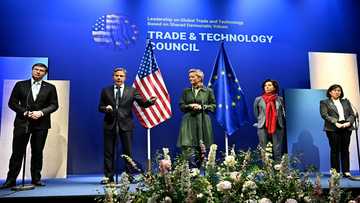Firms withheld pesticide toxicity data from EU: study

Source: AFP
PAY ATTENTION: Enjoy reading our stories? Join YEN.com.gh's Telegram channel for more!
Several major agrochemical companies did not disclose to European Union authorities studies assessing the toxic effects of pesticide ingredients on brain development, research said on Thursday.
The nine studies, which looked at how different nine pesticide chemical compounds affected the developmental neurotoxicity (DNT) in rats, were however shared with regulators in the United States, the Sweden-based researchers said.
The two companies behind the majority of the studies, German chemicals giant Bayer and Swiss agriculture firm Syngenta, said they complied with all regulatory requirements.
The researchers said their study, published in the journal Environmental Health, was the first that sought to quantify the seemingly "recurring phenomenon" of companies not disclosing DNT studies to EU authorities.
"It is outrageous and unbelievable that a good fraction of these studies do not make it to the authorities as required by law," study co-author Axel Mie of Stockholm University told AFP.
The researchers looked at the DNT studies on pesticide chemical compounds submitted to the US Environmental Protection Agency (EPA) in recent decades.
PAY ATTENTION: Follow us on Instagram - get the most important news directly in your favourite app!
Out of 35 studies conducted between 1993 and 2015 submitted to the EPA, nine were not shared with EU authorities, they found.
The studies were conducted on pregnant rats, testing whether the offspring of those exposed to the compounds suffered developmental problems.
Decreased weight gain, delayed sexual maturation and deteriorating motor activity were among the side effects reported in adult offspring in the studies.
Of the nine pesticide compounds, four have now been taken off the EU market, while another four are currently under review, Mie said.
"There must be legal consequences and serious ones for the companies if they do not follow the law," he said.
Bayer and Syngenta, which each sponsored three of the studies, rejected the conclusions of the research.
Bayer said in a statement sent to AFP that it has "always submitted the necessary studies that were required by the EU regulations at the time," adding that the process had changed over the years.
Syngenta said in a statement that it had "complied with all EU and Swiss data requests," adding that the studies in question were produced to meet US regulatory guidelines.
'Protecting brains of our children'
A spokesperson for the European Food Safety Authority (EFSA) said stronger legislation in this area came into force in 2021, which requires companies to share "all safety studies" about their products.
Study co-author Christina Ruden urged EU authorities to cross-check data with the EPA and other regulators, calling this change "low-hanging fruit".
But she added that "the absolutely most important action is to remove the responsibility of testing chemicals from the producers, and put that responsibility back on authorities."
While the studies on rats are not directly applicable to humans, the aim of DNT research is to protect people against chemicals which could affect their attention span, concentration, coordination, learning, memory and IQ, Mie said.
"This is about protecting the brains of our children," Ruden added.
New feature: Сheck out news that is picked for YOU ➡️ click on “Recommended for you” and enjoy!
Source: AFP



